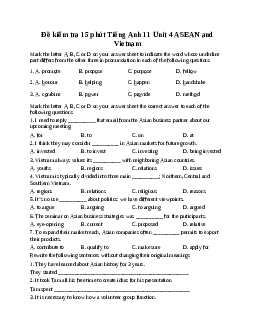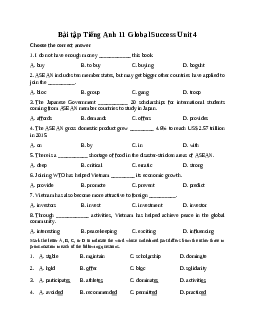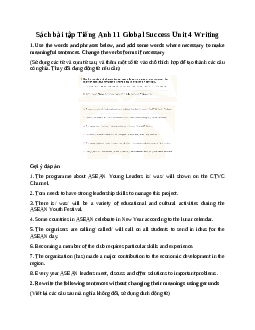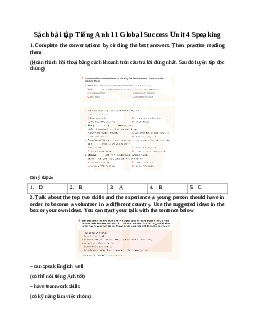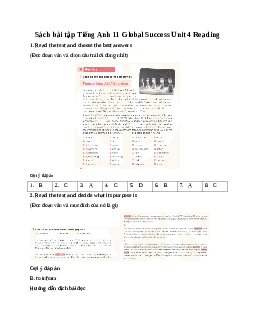




Preview text:
Ngữ pháp Unit 4 lớp 11 ASEAN and Viet Nam
DANH ĐỘNG TỪ GERUND (V + ING) 1. Subject of a sentence
Ex: Reading the story of Kieu is interesting.
2. Complement of to Be after Subject of Thing + To Be Ex: My hobby is fishing. 3. After Prepositions
Ex: She is interested in learning English. 4.
After some verbs: Verbs + Gerund
Admit , avoid appreciate, defer / delay /postpone/ put off , deny, detest/ dislike,
discuss, consider, enjoy, escape, finish, give up/ quit, imagine, keep, not mind, miss ,
practise, suggest, prevent, can’t help, can’t stand/ can't bear, resit, resist, cease ….etc.
I always avoid making noise in class.
I don’t mind doing a lot of homework.
Have you finished writing the report?
He can’t stand working ten hours a day.
Anne practised playing the piano at an
When did you give up smoking, Bill ? early age
5. VERB+PREPOSITIONS + GERUND:
Approve of, argue about, complain about, concentrate on, depend on, decide on, feel
like, forget about, Look forward to, insist on, keep on , object to, plan on , rely on ,
succeed in, think about , worry about …..
I’m interested in listening to music on the
Many overweight people try to lose weight radio.
by going on a diet.
He’s bored with staying at home day after
Don’t forget to turn off the gas before day. going out
Some people are afraid of driving in rush hours.
6. ADJECTIVE + PREPOSITION + GERUND:
Accustomed to afraid of , ashamed of, capable of, bored with ,disappointed in / with,
fond of, hopeful of, intent on, interested in, opposed to, proud of, responsible for,
sorry about, successful in, surprised at, tired from, tired of, worried about, be used to…..
Police soon get accustomed to arresting
The driver was intent on passing the criminals. other car.
Are you capable of completing the work within The treasurer is responsible for an hour? keeping the books
Eli Whitney is famous for inventing the cotton gin
7. After some Verbs + Object Combinations
Ex: We saw the thief entering the house.
Or He spent five hours doing his task.
8. In some other structures:
It’s no good / use, there is no point, what’s the point of, what about, be worth, be
busy, look forward to, be used to / be accustomed to / get used to, can’t help, can’t bear, can’t stand ……
It is no use saying that
I am used to getting up early.
THE INFINITIVE (TO + VERB)
1. Subject of the sentence Ex: To help her is my duty.
2. Verbs + to - Infinitive
Agree, afford, appear, arrange, attempt, ask, choose, decide, demand, expect, fail, happen,,
hope, learn, manage, offer, plan, pretend, promise, refuse, seem, threaten, want, wish, would
like, intend, tend , claim, desire, hope, hesitate …etc.
I decide to study engineering at University
We can’t afford to build a new house.
She’s expecting to get a reply from the
Bob refused to lend me his car. company.
You manage to get some tickets for the pop concert
Do you agree to join us for the holiday? on Saturday.
Mary learned to swim when she was young
3. Verbs + O + to - ×ninitive
Want, ask, tell, request, order, beg, remind, invite, advise, warn, promise , encourage He te
ll s me to send this letter.
The teacher encouraged Lan to join English club.
4. Be/ look/ seem/ feel + ADJECTIVE + TO infinitive:
Afraid, ashamed, considerate , disappointed , eager , foolish , fortunate , happy ,
lucky , pleased , proud, , ready , sorry , surprised , angry,prepared , glad, proud
I’m afraid to drive alone at night.
Citizens ought to feel lucky to be able to
Were you disappointed not to win the vote. race?
He was not at all surprised to hear the
The actress seems eager to go on stage. news.
The parents are proud to have a healthy
I’m looking for someone qualified to type a child. thesis.
The party is ready to serve. I'm glad to see you again. 5. After the verb TO BE
Ex: We are to pass the next exam.
My purpose is to win the next English competition.
6. After Noun (Infinitive of Purpose): TO / IN ORDER TO / SO AS TO + V
(bare infinitive)
Ex: There are lots of things to do today.
Ex: He studies hard so as to pass the entrance examination. I. B ARE - INFINITIVE
1. After modal verbs: can, may, must, … EX: I must go home now.
2. After had better, would rather, do nothing but.
EX: He did nothing but complain about his life.
You’d better stay at home today. 3. Make + O + V(bare-inf.) Let
EX: The clowns made them laugh a lot last night. II. VE
RB FOLLOWED BY EITHER INFINITIVE OR GERUNDS
Without changing in meaning: Start, begin, continue, intend, like, love, hate, prefer
It began to rain when I went to school.
It began raining when I went to school
When did you start learning English?
When did you start to learn English?
It began raining heavily. or
Does Pam continue writing to you?
He intended making a film for children
VERBS + GERUND or INFINITIVE Stop doing st
He stopped smoking three years ago. ( He doesn’t smoke any more now.) Stop to do st
He stopped to smoke a cigarette. ( He stopped
working in order to smoke ). try doing st
You should try taking these tablets, ( try = thöû ) try to do st
You should try to study harder. ( try = coá gaéng )
forget/ remember I remember sending a postcard to my parents doing st yesterday.
He remembers meeting you when he was in France. ( He met you).
forget/remember Don't forget to wash the dishes. to do st
Remember to sent me a letter when you arrive
in Ho Chi Minh city. ( you will send.) regret doing st
She regretted not coming your birthday party. So she felt bored regret to do st
I regret to inform you that you've failed your exam. need to do st
You need to practise English every day.( = You
have to practise English every day). need doing st
Your shirt needs washing. It smells. ( = Your =need to be done
shirt needs to be washed ). go on doing
The teacher introduced herself and went on to = to continue
explain the course. doing st go on to do
The teacher told everyone to be quiet, but they
just went on talking. like doing I like fishing like to do I like to do my job well. Notes:
would like + to- inf; feel like + V-ing = wish for
ALLOW, PERMIT, ADVISE, RECOMMEND Allow = permit V-ing + Advise = recommend O + to-inf.
I permit you to go out.
I permit going out
See, smell, notice, observe, taste, feel, overhear, hear, watch + O + Verb: the whole process
See, smell, notice, observe, taste, feel, overhear, hear, watch + O + Verb –
ing: action is happening
I saw someone get into Tom's house yesterday.
She heard him playing guitar. It's really great, but she must go away.
